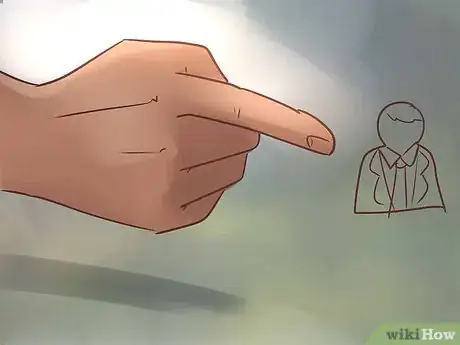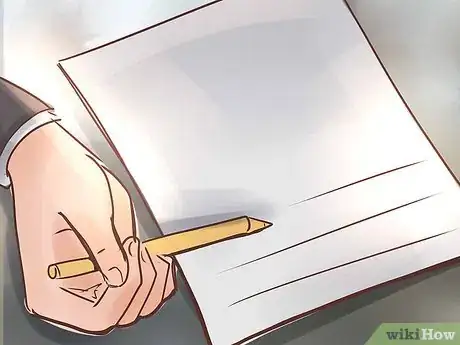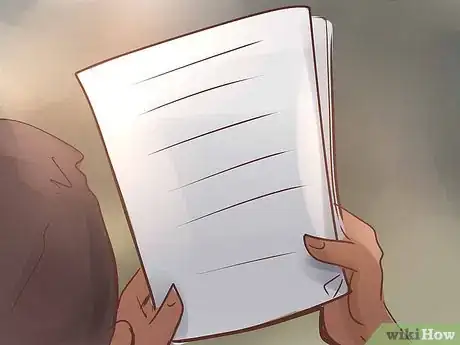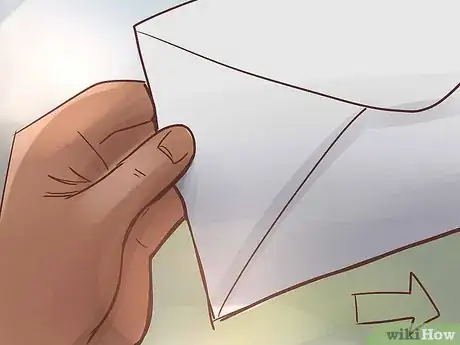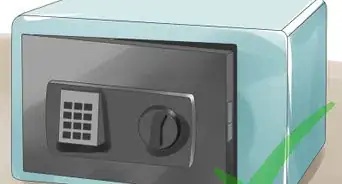This article was written by Jennifer Mueller, JD. Jennifer Mueller is an in-house legal expert at wikiHow. Jennifer reviews, fact-checks, and evaluates wikiHow's legal content to ensure thoroughness and accuracy. She received her JD from Indiana University Maurer School of Law in 2006.
This article has been viewed 56,794 times.
This article is written for persons living in the United States. Powers of Attorney in other jurisdictions do different things and have different rules and requirements. Please make sure you are consulting the laws of your own jurisdiction if you are not living in the United States.
If you are an attorney, this means you have the power to act on someone else's behalf. You’ll often hear lawyers referred to as attorneys-at-law, or simply as attorneys, because they have the power to act on behalf of their clients in particular legal situations. Likewise, when someone, as the principal, grants you durable power of attorney, you become their agent. Also called an attorney-in-fact, you are able to act on that person's behalf to make healthcare and financial decisions. Unlike an ordinary power of attorney, a durable power of attorney (POA) remains in effect even after your principal becomes incapacitated or unable to make decisions on his own.[1]
Steps
Being Chosen as Agent
-
1Understand the significance of a durable power of attorney. When someone grants you durable power of attorney, they give you permission to make a number of important medical and financial decisions on their behalf.
- Durable POAs frequently are used during estate planning, when someone knows they will soon become unable to make decisions on their own due to age, illness, or disability.
- Healthcare decisions may include refusing medical care, procedures or treatment. With durable POA, you may also consent to treatment on your principal's behalf, or withdraw prior consent that your principal made before losing consciousness.[2]
- Financial decisions include the ability to access all bank, retirement, and credit accounts, sign income tax returns, collect Social Security or other government benefits, sell stocks and make investments, and manage the principal's real estate.[3]
-
2Think carefully before you agree to be someone's agent. You will have the ability to make potentially life-altering decisions on your principal's behalf, so this is not something to take lightly.
- Typically people choose their spouse as their agent. However, you may have an unmarried or widowed friend or family member who wants you to become their agent. In that situation, ask them a lot of questions and make sure your values and beliefs are consistent with theirs, and that you won't be tempted to go against their wishes.
- For example, if your aunt wants to you to be her agent, but you learn that she is profoundly opposed to staying on life support for any length of time, you might decline her request if you know you couldn't agree to let the doctors pull the plug.
- You also want to make sure that you have the time, understanding, and capacity to handle the person's finances. If they have investment accounts or other property that you're clueless about, you might consider asking if you could have someone assist you with financial decisions who had more experience with those types of investment products.
Advertisement -
3Talk to your principal about becoming her attorney-in-fact. In some cases, your principal may already have health or mobility problems and be unable to do a lot of things on her own.
- If your spouse or another close friend or family member is having trouble managing their daily affairs and you are willing to help them out, talk to her as soon as possible.
- Be ready and willing to answer any questions she may have, both about the process and about what she will be expected to do.
- Make sure she understands the responsibilities you will take on as her agent, particularly when or if she becomes incapacitated.
- If she agrees to allow you to become your agent, make sure you have whatever account numbers or other information you'll need to access her financial and medical accounts.
-
4Identify a possible successor agent. Depending on your age or health, you may want to help your principal select a successor agent to take over if you become unavailable or incapacitated.
Creating a Durable Power of Attorney
-
1Find Durable Power of Attorney forms. Your principal may not be able to search for these forms, fill them out, or type them on her own. Pre-printed forms are available at non-profit organizations, financial or health care institutions, and office supply stores. All you have to do is fill in the blanks on the form with your principal's personal details.[4]
- Forms available at office supply stores and some online vendors will cost you money. These forms also may come as part of estate-planning books or kits.
- A variety of non-profit organizations, especially elder care organizations, offer these forms free of charge. If you go this route, make sure the form is specific to your state and county.
- If your principal already has an estate-planning lawyer, have her get in touch with his office. Since he is familiar with her estate, he can draft an agreement that works seamlessly and is consistent with her other estate plans.
- Even if you are acting both as healthcare POA and financial POA, your principal may have you sign separate documents, because you will need to show these documents to others who may not need to know all your personal details. For example, your principal's banker may need to see the POA to give you access to her bank accounts, but he doesn’t need to know her personal medical information.[5]
-
2Complete the form, or draft your own document. If you have a fill-in-the-blank form, provide the information necessary to complete the form, but do not sign it yet.
- Despite the fill-in-the-blank nature of forms, durable power of attorney is not always one-size-fits-all. Make sure both you and your principal read the document carefully and understand what each clause means. If your principal doesn't agree with something and doesn't want to include it, she can cross it out on the form and initial the change, or have you retype the form without that clause.
- If a pre-printed form includes too many problematic clauses, either for you or for your principal, you can always type up your own durable POA from scratch. Some states such as California have language written into their probate code that will suffice to create a durable power of attorney.
-
3Sign the document in front of a notary. Every state requires you and your principal to sign the durable POA in the presence of a notary. If you’re not sure where to find a notary, you can use the Notary Locator provided by the American Society of Notaries.
- Several states, such as Arizona, require another witness in addition to the notary to be present while you and your principal sign the POA. Make sure you’ve checked your state law and know whether you need a witness. If you have any doubts, bring an additional witness along just in case. The witness also must sign the document.[6]
- The durable POA goes into effect the moment it is signed.
-
4Distribute copies of your power of attorney document as necessary. Both you and your principal should have personal copies of the durable POA, and should keep those copies in a safe place. It typically isn’t necessary to file the document with a court or other government agency.[7]
- You will need multiple copies of each POA to distribute to anyone who requires proof that you are authorized to act on your principal's behalf. For example, you may need to file the medical POA with all of your principal's doctors or specialists. You also may have to present your financial POA to any banks or financial institutions to access your principal's accounts.[8]
- Some states, such as Arizona, require POAs to be recorded with the county recorder’s office if as agent you've been granted the power to transfer your real property. [9]
Resigning as an Agent
-
1Understand your principal can revoke your authority at any time. If your principal's condition improves, or if she decides she no longer wants a POA, she can revoke it whenever she wants as long as she's mentally competent.
- No lengthy form is necessary to do this, just a sentence written by your principal saying she revokes your power of attorney, followed by her signature.[10]
- Although it’s not strictly necessary, since the original POA was signed in the presence of a notary, the revocation has greater validity if it’s signed in front of a notary as well.
- Your principal will be responsible for taking a copy of the revocation to everyone who had a copy of the original POA. Until she does, anyone who has the POA can continue to use it.[11]
-
2Review your POA agreement and see if it includes a procedure for resignation. Some agreements include a clause describing how you should resign. If your agreement has such a clause you should follow that procedure.
-
3Give notice to your principal that you want to resign your duties. If your principal remains competent and you've decided you don't have the time or interest in continuing your role as agent, let her know that you no longer want to do it.
- Unless you have an emergency situation, consider giving her at least two weeks to find a new agent if she needs one, and arrange to assist her in finding a new agent or drafting a new durable POA agreement.
-
4Give notice to your principal's guardian and successor agent. If your principal is incompetent or incapacitated, give notice to her guardian as well as to anyone she named as a successor agent that you no longer want to carry out your duties as her agent.
- Note that if you resign and your principal is incapacitated, no one else can be appointed as an agent if she didn't name a successor agent in the POA.
References
- ↑ http://www.nolo.com/legal-encyclopedia/durable-power-of-attorney-health-finances-29579.html
- ↑ http://www.nolo.com/legal-encyclopedia/durable-power-of-attorney-health-finances-29579.html
- ↑ http://www.nolo.com/legal-encyclopedia/durable-financial-power-of-attorney-29936.html
- ↑ http://www.scscourt.org/self_help/probate/medical/poa.shtml
- ↑ http://www.nolo.com/legal-encyclopedia/durable-power-of-attorney-health-finances-29579.html
- ↑ http://www.superiorcourt.maricopa.gov/sscDocs/pdf/GNPOA_FAQ.pdf
- ↑ http://www.superiorcourt.maricopa.gov/sscDocs/pdf/GNPOA_FAQ.pdf
- ↑ http://www.nolo.com/legal-encyclopedia/durable-power-of-attorney-health-finances-29579.html
- ↑ http://www.superiorcourt.maricopa.gov/sscDocs/pdf/GNPOA_FAQ.pdf



